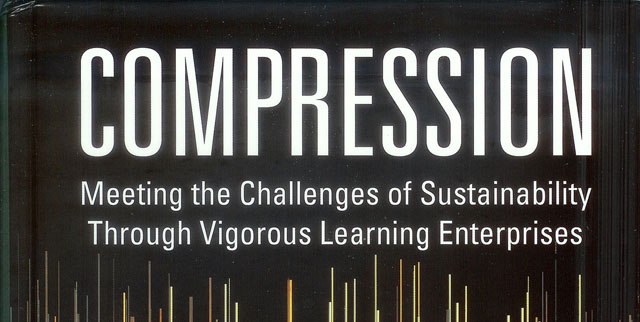Sustainability is a big umbrella term addressing a host of issues. Many writers emphasize only a few aspects of sustaining the planet in condition to support life, but the scope of concerns is so broad that it’s difficult – or impossible — to think about them all at once.
Consequently, an abundance of separate initiatives attack some aspect of sustainability; local recycling, alternative energy ventures, permaculture, green building codes (LEED), and so on. These are necessary for work to have a focus. However, probing a bigger picture of the problems shows that the scope of change needed is obviously much larger. Hand wringing or getting mad is of little avail. What do we really have to do differently? That led to the book, Compression.
Compression summarizes a sample of 21st century problems only in the first chapter. The rest of it dwells on how we must change, especially on how our working organizations must change to meet these challenges. The idea is to focus on what has to be done at the working level, and reason backward to what must be done institutionally to support it. The conclusion is that learning to work very differently will greatly alter the current system of economic thought, regardless of its past successes. Future newsletters will concentrate on this more than “threats to economic well being and sustainability.”
This revolution is fundamental; therefore easy both to reject, and to underestimate. The brief list below is only a start on a different way of thinking:
- Greatly reducing the use of materials and energy reduces the size of all other problems, like disposing of junk and eliminating toxic releases. Slow-working chemical or biological hazards may be the most difficult to foresee and fix.
- “Microeconomic” cost management “optimizes” using trade offs. But if you reduce the use of everything at once, there are no trade offs. This can be done in many cases. It has been done. But lean “kaizen” is only a primer for doing it.
- The established system of business thought often conflicts with no more than lean or quality thinking. To create fast-learning, high performance work organizations, beyond the best today, such an organization needs a “mission” and a methodology to assure fast-learning, adaptive performance at all times. This is at odds with objectives to “maximize revenue and profit.”
- Perhaps most difficult, human psyches are ill equipped for Compression Thinking. We opt for small rewards near-term even when long-term rewards or consequences are well known (hyperbolic discounting). We concentrate on tasks of the present, not consequences in the future. We mentally grab “solutions” without thinking situations through; don’t look at enough angles, see a problem in context, involve enough people, or ask enough why and what if questions. IQ is not strongly associated with habitually thinking deeply and clearly. Any system of organizational learning must counteract human weaknesses.
The buzz about organizational excellence over the past 30 years may seem boring by now. But perhaps we still have not comprehended enough fundamentals, and so have not really begun.

